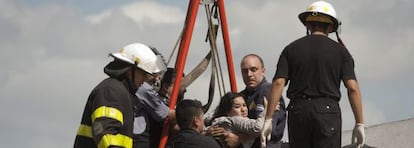Argentina's government takes control of trains after wreck
Families of the 51 dead and 700 injured demand justice

The Argentinean government on Tuesday took over the transportation company that operated two of Buenos Aires' largest commuter lines following last week's train accident that killed 51 passengers and injured more than 700 people during morning rush hour.
The move came after President Cristina Fernández de Kirchner vowed to punish those responsible for failing to keep safety measures on the train lines up to standard.
Meanwhile, hundreds of families of the victims and injured held a vigil Tuesday night in one of Buenos Aires' busiest intersections to demand justice. "We are passengers inside metal tombs," some of the demonstrators chanted.
The February 22 accident occurred after the driver of the commuter train on the main Sarmiento line slammed into a platform as he approached the busy Once train station in Buenos Aires.
Investigators have blamed the accident on brake failure.
Transportation officials had said the train was traveling at some 26 kilometers per hour when it slammed into the bumper and platform, plowing into dozens of people waiting to board and killing another number of passengers inside the cars.
"I am going to take the necessary decisions," Fernández de Kirchner said at a ceremony in Rosario. "Everything comes with a price because there are a lot of objections, a lot of spokes in a wheel that you need to control, and a lot of interests at stake." It was her first public comment on the incident since the accident.
The president gave judicial investigators 15 days to conclude their inquiry. In the meantime, Planning Minister Julio de Vido and Transportation Minister Juan Pablo Schiavi said the government would "temporarily" assume control of the private company Buenos Aires Trains (TBA), which holds the contract to run two busy lines in the capital.
"This is a temporary, cautionary measure we are taking because the public's safety is at stake here, and we must guarantee safe service and conditions for the passengers," De Vido said, as quoted by the daily La Nación .
The ministers said they had worked with President Fernández de Kirchner throughout the weekend on the plan, which would put TBA under a government-monitored receivership.
The families that gathered on July 9 Avenue at the intersection of Corrientes, near Buenos Aires' famous obelisk, said they wanted to meet with the president to be sure that the inquiry into the accident is completed as soon as possible and those responsible are punished.
Benigna Díaz, 70, who was one of the more than 700 injured in the crash, was trapped and pinned down in the wreckage for three hours before she could be rescued. In an interview with the daily Clarín on Tuesday, Díaz recounted how she was preparing to get off the train at the Once station when she heard a loud noise.
"When the train crashed, I fell down immediately and other people fell on top of me. At that moment I felt lots of pressure in my legs as if someone were clamping down on them with a pair of pliers. I couldn't move," she said. Fortunately, Benigna only suffered a fracture to one leg.
Still, there were some government officials who believe that the government may try to cover up some of the findings of the inquiry. Leandro Despouy, the country's comptroller general, said he has completed an inquiry into the train service, which was conducted before the Once disaster and contains a list of fallacies. The report was scheduled to be released on Wednesday, but Despouy has denounced the fact that other auditors aligned with Fernández de Kirchner's party want to postpone its release.
"I hope they respect my decision and release it on schedule," he said.
Tu suscripción se está usando en otro dispositivo
¿Quieres añadir otro usuario a tu suscripción?
Si continúas leyendo en este dispositivo, no se podrá leer en el otro.
FlechaTu suscripción se está usando en otro dispositivo y solo puedes acceder a EL PAÍS desde un dispositivo a la vez.
Si quieres compartir tu cuenta, cambia tu suscripción a la modalidad Premium, así podrás añadir otro usuario. Cada uno accederá con su propia cuenta de email, lo que os permitirá personalizar vuestra experiencia en EL PAÍS.
¿Tienes una suscripción de empresa? Accede aquí para contratar más cuentas.
En el caso de no saber quién está usando tu cuenta, te recomendamos cambiar tu contraseña aquí.
Si decides continuar compartiendo tu cuenta, este mensaje se mostrará en tu dispositivo y en el de la otra persona que está usando tu cuenta de forma indefinida, afectando a tu experiencia de lectura. Puedes consultar aquí los términos y condiciones de la suscripción digital.








































